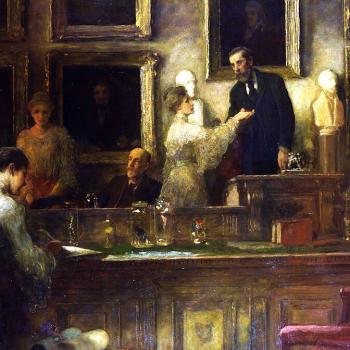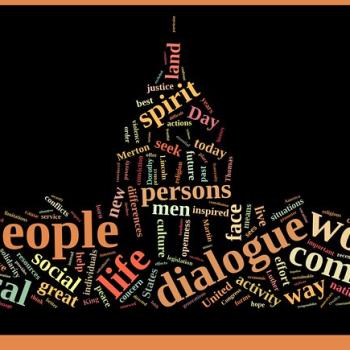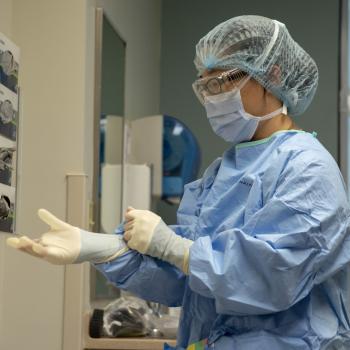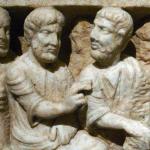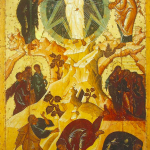In the novel, Galactic Pot-Healer, and in its rare companion volume written for children, Nick and the Glimmung, Philip K. Dick had a rather devastating vision of the future of the Earth.[1] Wars and overpopulation both changed the face of society. Resources, like food, while available were maxed out in how they were used, so extra burdens, like owning a pet, became illegal (as seen in Nick and the Glimmung, where Nick, broke the law and had a cat of his own, causing problems for him and his family) In both novels, colonization on other worlds was a possibility for some, which, if they accepted, gave them a lot more freedom, but also came with a lot of risks which many were not willing to accept.
Common to both, though much more emphasized in Nick and the Glimmung was the job situation of the future: jobs were scarce. Not everyone would have one, though everyone wanted one.
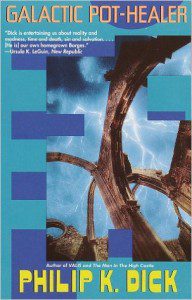
In Galactic Pot-Healer, the main character, Joe Fernwright had a unique skill, handed down in his family, that of “pot-healing,” being able to repair old, pre-war ceramics, which gave him work, albeit of a limited kind, because not many people owned such ceramic objects and those who did, rarely needed them to be fixed. And yet, while he was blessed with work, we only get a sense of what life was like for others who were not so blessed:
Along the sidewalks of the city the vast animallike gasping entity which was the mass of Cleveland’s unemployed – and unemployable – gathered and stood, stood and waited, waited and fused together into a lump both unstable and sad. [2]
Joe was aware of his special place in society, and in a way, he lived like others of his status, which as with most societies, included the need to display his status to others, to make himself look greater than he was because of it:
He speeded up, phased himself with the other swiftly striding peds – those others lucky enough, like himself, to have jobs, to have somewhere to go on the dingy Thursday morning in early April 2046, in the city of Cleveland in the Communal North American Citizen’s Republic. Or, he thought, at least to have something that looks like a job anyhow. A place, a talent, experience, and one day soon, an order to fill.[3]

Dick only hinted at the bleak situation on Earth in Galactic Pot-Healer, but when he wrote Nick and the Glimmung, he expanded upon those hints and gave a better picture of how terrible the work situation had become by telling us how it affected the father of the lead character:
Nicks’s dad worked fifteen hours a week, a special privilege; most people were allowed to work no more than ten hours a week. There were, in the world, certain lucky persons who were permitted to work twenty hours, and, in the case of extremely wealthy or powerful persons, twenty-two hours. To be allowed to work was the greatest honor a person could receive because there were so many people alive now that not enough jobs existed to go round. Many unlucky people had never worked a day in their lives. They filled applications, to be sure; they begged to be allowed to work. They wrote out long accounts of their training, their talents and qualifications. They applications were punch-coded and put into great computers … and the persons waited. Year after year passed, and still no jobs showed up; they waited in vain. [4]
The work week was shortened, but also the kind of work that was given out tended to be useless labor – to have a show of work instead of doing something necessary for the continuation of society. Nick’s father’s job was to make sure his partner signed documents, and nothing else than that. His partner always did, so the extra eye was not necessary – it was work which many would have loved to take, to say they had a job – and yet it really wasn’t work, it didn’t satisfy the soul, as Nick’s father expressed, “I ask myself, What am I for? Do I exist to do a job? No. The job exists merely to give me the illusion that I am doing something.”[5] The key, which he realized, is that he really didn’t need to do the job, no one did. He wanted another job, one which had meaning, one which affected people so that if he didn’t do it, they would notice it. And yet, as Nick’s mother pointed out, that wasn’t realistic. His situation was like anyone else’s, and so she once told him, “But that’s true of most jobs now! Computers can do just about everything.”[6]
Computers can do just about everything.
More than problem with overpopulation, this comment from Nick’s mother represents the truth of the future, not just in Philip K. Dick’s fictional world, but in ours, the real world. Computers, robots, machines – they can do “just about everything.” The more our technology advances, the more we find computers and other machines taking over and doing our jobs. No kind of job is safe: from fast food workers all the way up to white collar jobs, the job market is diminishing because of technology. Some people do not want to admit it, for as they say, the more jobs are taken over by computers, the more they believe other kinds of jobs come about; and it is true, there are some new kinds of jobs created as a result of technology, but the number taken over far exceeds the new kinds of jobs which are created, so that we find ourselves having a net loss of available jobs as a result. The more computer technology advances, the more computers will be able to be programmed to take over those “new kinds of jobs” so that there will be less and less of such jobs as well. Indeed, it is quite possible that in the not so distant future, we are going to have to deal with the real situation of a world where most workers are not needed. The job market today is already beginning to feel the effects of these changes, and those affected are often mistreated by those who do not understand the new circumstances of the current workforce, often treated as if the reason why they are poor and without work is to do with sloth or stupidity instead of accidents beyond their control.
We have to deal with the changing situation now, and we have to do so with some basic principles in mind. One, we have to respect the dignity of life, and so such, find a way to recognize those who are affected by the changing nature of work, and not degrade them. Secondly, as more and more people come to live in a world where labor is not necessary, the relationship between work and the basics of life will have to be rethought. Catholic Social Doctrines gives the foundation for this with its teaching of the universal destinations of goods, that the goods necessary for life should be, in some fashion or another, shared in common. Pope Paul VI explained this well when he said:
Now if the earth truly was created to provide man with the necessities of life and the tools for his own progress, it follows that every man has the right to glean what he needs from the earth. The recent Council reiterated this truth: “God intended the earth and everything in it for the use of all human beings and peoples. Thus, under the leadership of justice and in the company of charity, created goods should flow fairly to all.”
All other rights, whatever they may be, including the rights of property and free trade, are to be subordinated to this principle. They should in no way hinder it; in fact, they should actively facilitate its implementation. Redirecting these rights back to their original purpose must be regarded as an important and urgent social duty.[7]
When the goods are being produced without the need for human labor, there needs to be a system put in place which allows for the just distribution of goods, so that all can have a fair share of what is produced. This is not to say forced “equality” per se – but it must be a just system, so that the lowest margins of society do not lose human dignity and so receive what is necessary for a good life. How this system is to be put in place is for us to consider now – as the new way of life is slowly emerging, so that we do not find ourselves in a major crisis situation, with a huge population without work, without resources due to our lack of concern for the future of humanity. It will require a lot of effort and prudential considerations by experts to help society evolve to the new situation, in as free a fashion as possible; what those decisions should be is beyond the scope of investigation here. What is needed is the realization that such work needs to be done, and needs to be done sooner than later, because the crisis is coming, and a lot of the problems in the job market today, often seen as coming as a result of globalization, really comes as a result of these technological changes, and are the birth pains of the new society of the future. So many workers are already fighting over the scant job opportunities now, and what Philip K Dick described about the application process of the future, we see happening today. Right now, those with the wealth and resources, the so-called job creators, are taking advantage of this for their own benefit, lowering the wages of their workers and making the work conditions worse and worse; and until something is done to put a stop to this injustice, we will see the situation getting worse, with more people with the right skills not having jobs and fighting each other for less and less pay and less and less status in society.
Thirdly, we are going to have to figure out what we do, as a society, when most of us find ourselves no longer needed for labor. The dark undertone of Philip K Dick’s world shows one possible outcome: desperation, where the masses of humanity become as it were disposable humans with little to no self-worth. Another possibility, and extremely likely, is that humanity will try to overcome the personal crisis through epicurean means – that is, taking the opportunity given to them to live life in a more and more luxurious fashion, enjoying themselves by pleasure-seeking, and finding that to be the whole of life itself. Technology will allow all forms of pleasure to be fulfilled, but in following through with such pleasure-seeking, we will find our life becomes meaningless, and all that people will do is try to hide the meaningless of their existence from themselves through greater and greater forms of pleasure-seeking like an addiction. And as an addiction, if not treated, it will lead to a terrible and desperate end, not just for individuals, but for society as a whole.[8]
This is not a necessary outcome.
It is quite possible to take advantage of the changing situation, and use it to see through the material universe and all its external pleasures, to see how unsatisfying it is, and truly detach ourselves from it in a new and proper way. We will have what we need to survive, and we will be able to use it without all the kinds of concerns humanity used to have with scarcity of resources: there will be no need to fight over the things all people can have easily and freely. We will possess them, but we will no longer have to be possessed by them.
This, again, is where Catholic (and other religious) spirituality can help make sure humanity remains sane, by encouraging spiritual exploration, by truly taking the opportunity to become a new kind of mystic. The same advantages given to hermits in the Egyptian desert, where they found themselves living detached from material life, can pave the way for the future. It is not that we will live without material things, but rather, we will be able to live without fighting for and attaching ourselves to them. We will be free to focus on our own spiritual life, our own spiritual needs, our own inner fight for meaning. We will have time for meditation and prayer – and should be encouraged to use that time wisely, to find new avenues of human existence without having to fall back to hedonism to drown out the banality of existence. Likewise, we will new new ways to engage our own creative nature, which is often touched and used in our work life now because work, though we often do not like it, does give us a lot of satisfaction in life when we accomplish something difficult in our labor, an accomplishment which often uses elements of our creative abilities. The arts and crafts movement of the past might give us a way to address this problem in the future, and so writings by thinkers like William Morris should be given consideration here. We will see that people can be encouraged to use their raw talents in ways beyond servile labor for someone else, while also not pursuing the arts merely as a kind of vain entertainment. The arts, and with it the beauty which is produced, is an important part of life, as it gives expression to the glory of grace, the glory of the kingdom of God. To creatively engage the arts, not as a means of mere entertainment, but as a way of engaging life, will allow us to share with one another that glory, that grace, as we represent our inner spiritual nature to others, sharing it not out of forced labor but out of love. Indeed, it will allow to actually engage our inner spiritual nature, being made in the image and likeness of God, as we find the purpose of life includes being subcreators, creating not for the sake of personal gain, but for the enhancement of life for all. But like the need to plan out ahead what will happen with the distribution of goods, we need to plan out ahead how to encourage people to this way of life now before it is too late and we find ourselves stuck in a spiritual crisis of our own creating which we cannot overcome. If we do not, we will likely end up imitating the terrible scenario written about, and feared by, Philip K. Dick, where the solution will be the banality of fake “jobs” which are at once unsatisfactory and yet the focus of life, of what people who do not have fight each other for, just to feel like they have a worthwhile life. If we can’t show now how life is worthwhile in and of itself, of the good contained in us beyond the accidents of worldly life, then life will be meaningless no matter how many ways we try to mask the sense of worthlessness we feel instead.
We are, as a society, at a crossroads. It is time we realize it, and work out the solution, together, before it is too late.
[1] Philip K Dick wrote Galactic Pot-Healer before he knew what he wanted to do in his next stage of science-fiction novel writing, and so it was a novel he pushed himself to write and he did not seem to like the result. While there are weaknesses in the text, I find it is rather unique in Dick’s overall body of work. With its ability to engage metaphysical and social problems with a high level of comic critique, and his ability to work in Lovecraftian ideas into the mix, I personally find the book to be one of Dick’s best.
Nick and the Glimmung was written using many of the same themes as Galactic Pot-Healer, but the story was written so it could be enjoyed by children. As such, one of the big changes, beyond the style of writing, was making the main character a child instead of an adult. It is an excellent companion novel to Galactic Pot-Healer, although it is likely that the world in both of them is not exactly the same world, that is, we are probably dealing with similar parallel worlds, for the situation on Earth in Nick and the Glimmung seems to be worse off than in Galactic Pot-Healer. Nonetheless, even if what we find in Nick and the Glimmung is a more drastic situation than in Galactic Pot-Healer, the same problems on Earth seem to be found in both novels, and can be discussed as providing a united “vision” of the future for that reason.
[2] Philip K. Dick, Galactic Pot-Healer (New York: Vintage, 1994), 33.
[3] Ibid., 5.
[4] Philip K. Dick, Nick and the Glimmung (Burton, MI: Subterranean Press, 2009), 18.
[5] ibid., 19.
[6] ibid., 18.
[7] Pope Paul VI, Populorum Progressio. Vatican Translation. http://w2.vatican.va/content/paul-vi/en/encyclicals/documents/hf_p-vi_enc_26031967_populorum.html
[8] This was the vision Michael Moorcock had with his novels of the far future, that is, in his Dancers at the End of Time series. The last humans had everything they could want. They were immortals with power to create what their imagination would produce. As a result, they became very base, partying all the time, trying to find a way to cope with the melancholy which comes out of such purposeless existence.
Stay in touch! Like A Little Bit of Nothing on Facebook:
A Little Bit of Nothing









